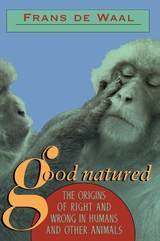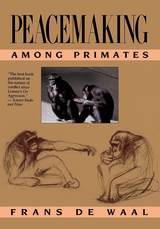
To observe a dog's guilty look.
to witness a gorilla's self-sacrifice for a wounded mate, to watch an elephant herd's communal effort on behalf of a stranded calf--to catch animals in certain acts is to wonder what moves them. Might there he a code of ethics in the animal kingdom? Must an animal be human to he humane? In this provocative book, a renowned scientist takes on those who have declared ethics uniquely human Making a compelling case for a morality grounded in biology, he shows how ethical behavior is as much a matter of evolution as any other trait, in humans and animals alike.
World famous for his brilliant descriptions of Machiavellian power plays among chimpanzees-the nastier side of animal life--Frans de Waal here contends that animals have a nice side as well. Making his case through vivid anecdotes drawn from his work with apes and monkeys and holstered by the intriguing, voluminous data from his and others' ongoing research, de Waal shows us that many of the building blocks of morality are natural: they can he observed in other animals. Through his eyes, we see how not just primates but all kinds of animals, from marine mammals to dogs, respond to social rules, help each other, share food, resolve conflict to mutual satisfaction, even develop a crude sense of justice and fairness.
Natural selection may be harsh, but it has produced highly successful species that survive through cooperation and mutual assistance. De Waal identifies this paradox as the key to an evolutionary account of morality, and demonstrates that human morality could never have developed without the foundation of fellow feeling our species shares with other animals. As his work makes clear, a morality grounded in biology leads to an entirely different conception of what it means to he human--and humane.

Does biology condemn the human species to violence and war? Previous studies of animal behavior incline us to answer yes, but the message of this book is considerably more optimistic. Without denying our heritage of aggressive behavior, Frans de Waal describes powerful checks and balances in the makeup of our closest animal relatives, and in so doing he shows that to humans making peace is as natural as making war.
In this meticulously researched and absorbing account, we learn in detail how different types of simians cope with aggression, and how they make peace after fights. Chimpanzees, for instance, reconcile with a hug and a kiss, whereas rhesus monkeys groom the fur of former adversaries. By objectively examining the dynamics of primate social interactions, de Waal makes a convincing case that confrontation should not be viewed as a barrier to sociality but rather as an unavoidable element upon which social relationships can be built and strengthened through reconciliation.
The author examines five different species—chimpanzees, rhesus monkeys, stump-tailed monkeys, bonobos, and humans—and relates anecdotes, culled from exhaustive observations, that convey the intricacies and refinements of simian behavior. Each species utilizes its own unique peacemaking strategies. The bonobo, for example, is little known to science, and even less to the general public, but this rare ape maintains peace by means of sexual behavior divorced from reproductive functions; sex occurs in all possible combinations and positions whenever social tensions need to be resolved. “Make love, not war” could be the bonobo slogan.
De Waal’s demonstration of reconciliation in both monkeys and apes strongly supports his thesis that forgiveness and peacemaking are widespread among nonhuman primates—an aspect of primate societies that should stimulate much needed work on human conflict resolution.
READERS
Browse our collection.
PUBLISHERS
See BiblioVault's publisher services.
STUDENT SERVICES
Files for college accessibility offices.
UChicago Accessibility Resources
home | accessibility | search | about | contact us
BiblioVault ® 2001 - 2024
The University of Chicago Press









